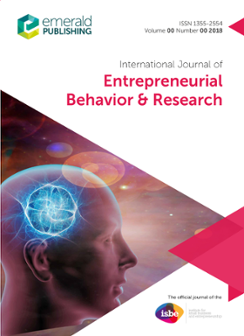国际创业认知的可塑性:一项关于自愿和非自愿冲击的自然准实验研究
IF 4.7
2区 管理学
Q1 BUSINESS
International Journal of Entrepreneurial Behavior & Research
Pub Date : 2022-01-11
DOI:10.1108/ijebr-08-2021-0639
引用次数: 10
摘要
目的研究国际创业认知的持久性。具体而言,他们研究了先进的商业教育和Covid-19大流行如何影响国际创业导向倾向(IEOD),以及随后的创业意图(ei),以更好地理解支撑国际创业驱动因素的心理动态。在新兴的创业认知和国际创业取向研究的背景下,作者认为计划的商业教育干预(自愿)和不可预见的激进环境变化(非自愿)都构成了影响创业倾向和意向的认知冲击。作者使用了Covid-19前和后的面板数据(n = 233),并通过OCEAN人格评估的变化独特地确定了Covid-19的特殊认知影响。研究结果表明,当个体感知到新冠肺炎的心理影响较低时,商业教育会增加IEOD。相反,对Covid-19影响的强烈感知降低了IEOD量表中的冒险和主动性成分。作者将同样的影响追溯到环境影响评价。本文通过对IEOD量表的实证检验,有助于更好地理解创业倾向的弹性,并展示了其在计划干预和计划外外部诱发冲击下的边界条件。实践意义本研究为国际创业倾向可延展性的实践者提供了第一个基准,并讨论了鼓励国际创业行为的潜力以及外生冲击带来的个人层面的倾向风险。该研究独特地采用了我们在covid -19之前的所有构建的基线测量方法,以辨别和隔离大流行对创业倾向和意图的影响,响应了最近对创业研究中更多实验设计的呼吁。本文章由计算机程序翻译,如有差异,请以英文原文为准。
The malleability of international entrepreneurial cognitions: a natural quasi-experimental study on voluntary and involuntary shocks
PurposeThe authors investigate the durability of international entrepreneurial cognitions. Specifically, they examine how advanced business education and the Covid-19 pandemic influence international entrepreneurial orientation disposition (IEOD), and subsequently entrepreneurial intentions (EIs), to better understand the psychological dynamics underpinning the drivers of international entrepreneurship.Design/methodology/approachAgainst the backdrop of emerging entrepreneurial cognition and international entrepreneurial orientation research, the authors theorize that both a planned business education intervention (voluntary) and an unforeseeable radical environmental (involuntary) change constitute cognitive shocks impacting the disposition and intention to engage in entrepreneurial efforts. The authors use pre- and post-Covid-19 panel data (n = 233) and uniquely identify the idiosyncratic cognitive effects of Covid-19 through changes in the OCEAN personality assessment.FindingsFindings demonstrate that when individuals' perceived psychological impact of Covid-19 is low, business education increases IEOD. Conversely, the effects of a strongly perceived Covid-19 impact reduce the risk-taking and proactiveness components of the IEOD scale. The authors trace the same effects forward to EIs.Research limitations/implicationsThis paper contributes to a greater understanding of the resilience of entrepreneurial dispositions through an empirical test of the IEOD scale and shows its boundary conditions under planned intervention as well as unplanned externally induced shock.Practical implicationsThe study offers a first benchmark to practitioners of the malleability of international entrepreneurial dispositions and discusses the potential to encourage international entrepreneurial behaviour and the individual-level dispositional risk posed by exogenous shocks.Originality/valueThe study uniquely employs a baseline measure of all our constructs pre-Covid-19 to discern and isolate the pandemic impact on entrepreneurial dispositions and intentions, responding to recent calls for more experimental designs in entrepreneurship research.
求助全文
通过发布文献求助,成功后即可免费获取论文全文。
去求助
来源期刊
CiteScore
10.20
自引率
16.40%
发文量
94
期刊介绍:
The International Journal of Entrepreneurial Behavior & Research (IJEBR) has a unique focus on publishing original research related to the human and social dynamics of entrepreneurship, and entrepreneurial management in small and growing organizations. The journal has an international perspective on entrepreneurship and publishes conceptual papers and empirical studies which bring together issues of interest to academic researchers and educators, policy-makers and practitioners worldwide.The editorial team encourages high-quality submissions which advance the study of human and behavioural dimensions of entrepreneurship and smaller organizations. Examples of topics which illustrate the scope of the journal are provided below. Topicality Nascent entrepreneurship and new venture creation Management development and learning in smaller businesses Enterprise and entrepreneurship education, learning and careers Entrepreneurial psychology and cognition Management and transition in smaller, growing and family-owned enterprises Corporate entrepreneurship and venturing Entrepreneurial teams, management and organizations Social, sustainable and informal entrepreneurship National and international policy, historical and cultural studies in entrepreneurship Gender, minority and ethnic entrepreneurship Innovative research methods and theoretical development in entrepreneurship Resourcing and managing innovation in entrepreneurial ventures.

 求助内容:
求助内容: 应助结果提醒方式:
应助结果提醒方式:


